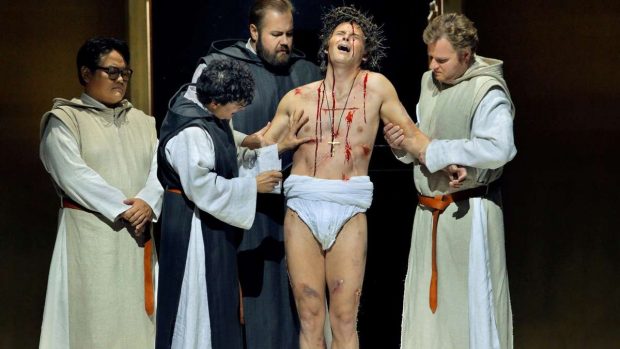Parsifal
Bayreuth Festival, until 28 August
In the days leading up to this year’s Bayreuth Festival, Bavaria was rocked by a spate of violent attacks. Security measures ran high for the premiere of a new Parsifal rumoured to be awash in Islamic symbolism. Such reports proved true, with the production set in a contemporary Middle Eastern country under threat, possibly from Isis. Far from being lauded as avant, however, the staging by Uwe Eric Laufenberg was instantly dubbed ‘Provinztheater‘, or ‘provincial theater’, the worst insult that the well-heeled festival audience could come up with. I disagree. Calling Laufenberg’s dull and confused staging ‘Provinztheater’, is an insult to the country’s provincial theatres, where I’ve seen many excellent things over the years (including a superb Parsifal in the quaint Hanseatic city of Lübeck, known as the birthplace of marzipan).
Laufenberg, who heads the Staatstheater in Wiesbaden, was an eleventh-hour replacement for the controversial artist Jonathan Meese, ditched by the festival and its director, Katharina Wagner (the composer’s great granddaughter) last summer, officially over budgetary concerns. I wouldn’t be surprised, however, if Meese’s provocative shenanigans – such as fellating a swastika-tattooed alien and Sieg Heil-ing during one performance – had something to do with it.
So instead of risking the envelope-pushing production that Meese was bound to deliver, the festival went with Laufenberg’s lukewarm vision that drew chuckles for its poorer inspirations, including flower maidens in burkas and naked extras dancing ecstatically in a Good Friday downpour. This was, by and large, a narrative staging, yet one that failed to meet the base requirements of telling the story, which went missing amid the director’s ecumenical message about the world’s religions throwing off their repressive shackles.
Replacing Andris Nelsons, who quit the première after a reported tiff with Bayreuth’s music director Christian Thielemann, the festival tapped the East German maestro Hartmut Haenchen. One feels certain that Nelsons would have brought greater emotion to the work, but there was little arguing with Haenchen’s masterly control and understanding of the music’s sweeping arc. It’s been a long time since Parsifal sounded so noble and swift.
Festival favorite Klaus Florian Vogt cut a noble figure as Parsifal, although his otherworldly wafting tenor is far better suited to Lohengrin. The best all-around performance belonged to Georg Zeppenfeld as the pontificating knight Gurnemanz. The German bass – also playing Marke at the festival – sang with tempered power, his glowing and expressive voice breathing fresh life into his long narrative. American bass-baritone Ryan McKinny was a mighty Amfortas, although he made the suffering knight sound more furious than anything else while looking like jailbait in a frequently topless performance. Gerd Grochowski glowered evilly as the dark wizard Klingsor, while Karl-Heinz Lehner rounded off the collection of deep voices as the dying king Titurel. As the time-travelling seductress Kundry, the opera’s sole female character, Russian mezzo-soprano Elena Pankratova was appropriately unhinged, although two other Kundrys of recent memory, Anja Kampe and Waltraud Meier, have made more indelible impressions.
Despite the musical and vocal accomplishment, in the absence of an engaging staging, Bayreuth’s notoriously hard-backed seats were the main thing keeping the audience awake for the five hours.






Comments